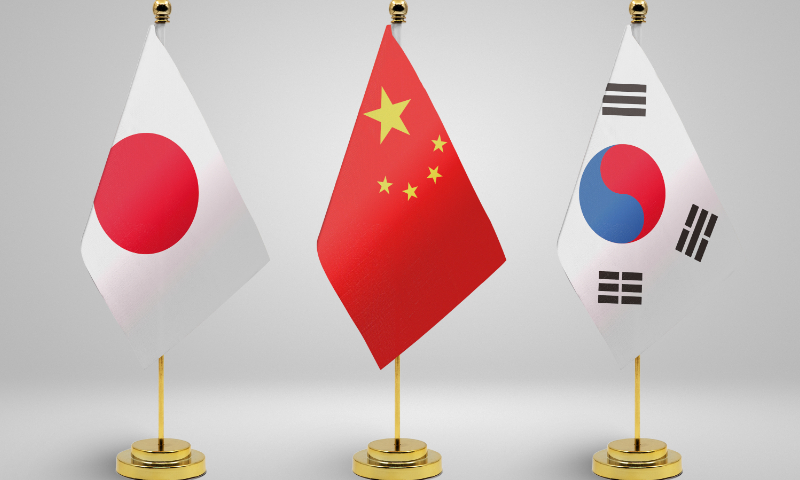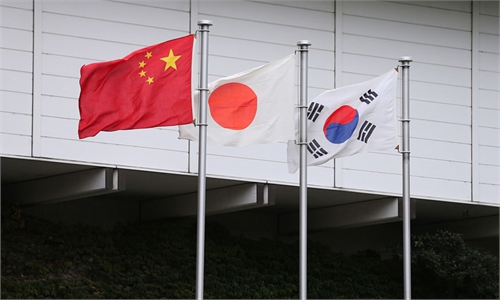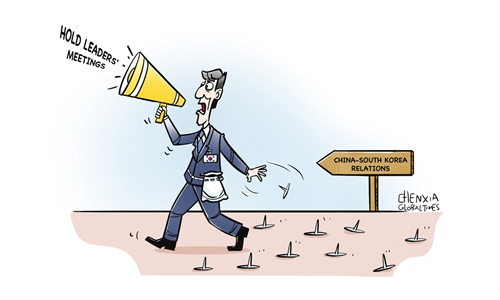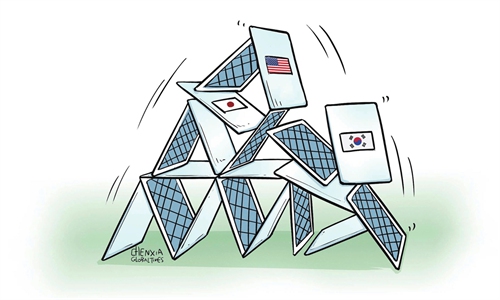Japan and S.Korea should cherish this hard-won 'restart': Global Times editorial

File Photo
According to South Korea's Ministry of Foreign Affairs, China, Japan, and South Korea are set to hold a trilateral high-level meeting in Seoul on September 26. This is widely seen as an important step toward reviving the trilateral cooperation mechanism, which has been on hold for over three years. As the current chair for this year, South Korea has stated that the high-level meeting will focus on advancing the trilateral consultation mechanism, jointly assessing the current state of cooperation among the governments of the three countries, and exploring future directions. This, to some extent, can dilute the "new cold war" cloud that hangs over the region.
China-Japan-South Korea cooperation once experienced its shining moments in Asian sub-regional cooperation. The trilateral cooperation mechanism originated from a breakfast meeting of leaders of the three countries during the ASEAN Plus Three or 10+3 meeting in 1999, and it has been evolving for nearly 24 years. Over the past years, the three countries have held eight leaders' meetings and nine foreign ministers' meetings, established 21 ministerial-level meetings and over 70 dialogue mechanisms. The trade volume has grown from $130 billion in 1999 to over $800 billion. The trilateral cooperation has shifted from being a "rising star" to a "high-performing asset," holding significant influence in the fields of economy and trade in Asia and even globally.
However, recently, the momentum of mutual trust, deepening cooperation, and shared development that China, Japan, and South Korea had been steadily building over the previous 20 years has indeed been disrupted by external forces. This is an undeniable reality for the three nations and also regrettable. Under the promotion of the US, Japan and South Korea rapidly shifted from hostility to friendship, aligning themselves with the US on both sides of the geopolitical landscape in Northeast Asia, and their joint efforts against China have become increasingly prominent.
Whether it is the extreme US suppression of Chinese semiconductors, interference in and provocation over the Taiwan question, the core of China's core interests, or NATO's expansion into the Asia-Pacific region, both Japan and South Korea have been involved and exacerbated regional tensions. Japan's insistence on dumping nuclear-contaminated wastewater into the sea, despite international opposition, is also a new issue.
One of the most urgent tasks facing China, Japan, and South Korea is to maintain regional stability, ensuring they do not continue down the dangerous path of security dilemmas. Then, they need to firmly steer in the right direction, staying on the road of mutual benefit, cooperation and shared development. It is crucial for the three nations to rebuild and solidify consensus on major issues, while being vigilant, rejecting negative influence that external factors have on geopolitics and opposing pan-security issues. It must be acknowledged that achieving these goals in the current atmosphere and environment is not easy. Some beneficial practices that have played a critical role in advancing China-Japan-South Korea cooperation in the past remain effective and can be emulated today. For instance, maximizing the influence of civil society in the three countries to encourage official cooperation, using economic cooperation to drive political collaboration, and promoting central government engagement through local initiatives, among others.
The tremendous changes in the trilateral relationship among China, Japan, and South Korea have overshadowed some things that have not changed. In relation to "change," "stability" is fundamental, just like an anchor hidden beneath the sea, preventing the ship of Northeast Asia, carrying China, Japan, and South Korea together, from capsizing in the face of storms. One of these "stabilities" is the unchanged basic framework of "gain from cooperation, lose from confrontation" in the trilateral relationship among China, Japan, and South Korea. Due to economic interdependence, the three countries are indispensable partners. Second, although influenced by external factors, the central task set by the three countries remains economic development. Third, what will never change is that China, Japan, and South Korea are neighboring countries with close geographical and cultural ties. These "stabilities" prevent us from being overly pessimistic about the trilateral relationship among China, Japan, and South Korea. In the face of negative news and continuous headwinds, we should see and grasp the mainstream of the three countries' common interests.
The first joint declaration issued by China, Japan, and South Korea in 2003 clearly stated that "The tripartite cooperation is aimed at boosting development, strengthening East Asian cooperation and safeguarding peace and prosperity at the regional and global levels." This is the original intention of trilateral cooperation and the responsibility of the three countries. It is undeniable that the complex relationship among China, Japan, and South Korea reflects the challenges faced by this region to a large extent. However, the progress of Northeast Asia should not be hindered by "small circles" and forget the broad ambitions and perspectives of the past.
Currently, China, Japan, and South Korea all hold a positive attitude toward trilateral cooperation. This is a rare opportunity, although it still carries uncertainties. We should overcome differences through cooperation and resolve conflicts through mutual benefit and win-win solutions. This has always been China's consistent attitude and experience. We hope that Japan and South Korea can cherish this hard-won "restart" opportunity and make this high-level meeting a new starting point for trilateral cooperation, opening up more promising possibilities.



